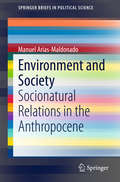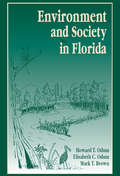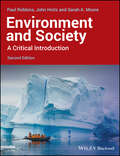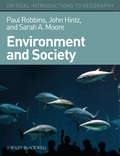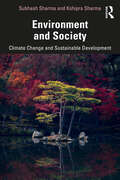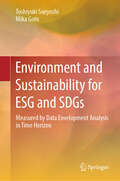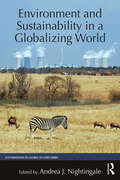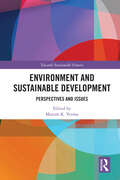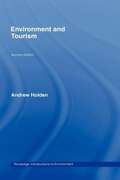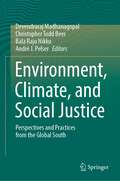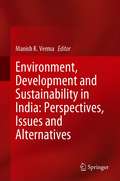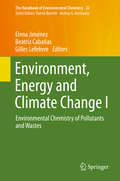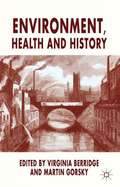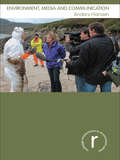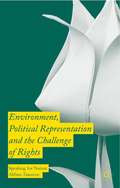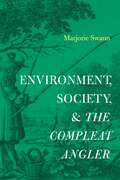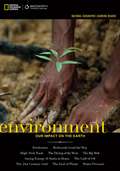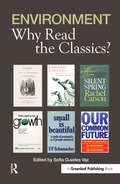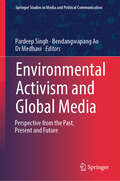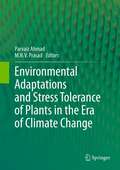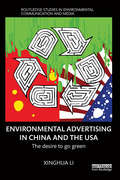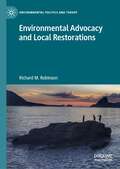- Table View
- List View
Environment and Society
by Manuel Arias-MaldonadoThis short book sets out to explore the concept of nature in the context of a changing reality, in which the extent of our transformation of the environment has become evident: What is nature and to what extent has humanity transformed it? How do nature and society relate to one another? What does the idea of a sustainable society entail and how can nature be understood as a political subject? What is the Anthropocene and how does it affect nature as both an idea and a material entity? Has nature perhaps "ended?" In addressing these questions, the author delivers a concise but meaningful study of contemporary understandings of nature, one that goes beyond the limits posed by a single discipline. Adopting a truly comprehensive perspective, the work incorporates classical disciplines such as philosophy, evolutionary theory and the history of ideas; new and mixed approaches ranging from environmental sociology to neurobiology and ecological economics and the emerging area of the environmental humanities and represents a growing branch of political thought that views nature as a new political subject.
Environment and Society in Florida
by Howard T. OdumWith its lush wetlands, miles of beaches, and wide array of colorful wildlife, Florida is a fascinating and important ecosystem to study. Using this state as a model, Environment and Society in Florida offers a whole systems approach to understanding the environment and discusses the interactions between human systems and natural systems. It addresses the complicated issues stemming from these interactions among population, resources, economics, and environment, and discusses how we may better manage these challenges in the future.
Environment and Society: A Critical Introduction
by Paul Robbins John Hintz Sarah A. MooreSubstantially updated for the second edition, this engaging and innovative introduction to the environment and society uses key theoretical approaches to explore familiar objects. Features substantial revisions and updates for the second edition, including new chapters on E waste, mosquitoes and uranium, improved maps and graphics, new exercises, shorter theory chapters, and refocused sections on environmental solutions Discusses topics such as population and scarcity, commodities, environmental ethics, risks and hazards, and political economy and applies them to objects like bottled water, tuna, and trees Accessible for students, and accompanied by in-book and online resources including exercises and boxed discussions, an online test bank, notes, suggested reading, and website links for enhanced understanding Offers additional online support for instructors, including suggested teaching models, PowerPoint slides for each chapter with full-color graphics, and supplementary images and teaching material
Environment and Society: A Critical Introduction (Critical Introductions to Geography #13)
by Paul Robbins John Hintz Sarah A. MooreEnvironment and Society: A Critical Introduction is an overview of the diverse conceptual tools and traditions for thinking about, explaining and addressing the environmental challenges we face in the contemporary world. Provides an introduction to the environmental challenges we face in the contemporary world through foundational theoretical ideas illustrated with concrete, everyday examples Utilizes compelling, conversational language to expound on theory, history, and scientific topics, making the text accessible to a diverse readership Draws upon contemporary theoretical understandings in nature/society theory while demonstrating through practice and deployment Includes discussion of key historical events, topical issues, and policies, as well as scientific concepts
Environment and Society: A Reader
by Colin Jerolmack Anne Rademacher Christopher Schlottmann Dale Jamieson Maria DamonEnvironment and Society connects the core themes of environmental studies to the urgent issues and debates of the twenty-first century. In an era marked by climate change, rapid urbanization, and resource scarcity, environmental studies has emerged as a crucial arena of study. Assembling canonical and contemporary texts, this volume presents a systematic survey of concepts and issues central to the environment in society, such as: social mobilization on behalf of environmental objectives; the relationships between human population, economic growth and stresses on the planet’s natural resources; debates about the relative effects of collective and individual action; and unequal distribution of the social costs of environmental degradation. Organized around key themes, with each section featuring questions for debate and suggestions for further reading, the book introduces students to the history of environmental studies, and demonstrates how the field’s interdisciplinary approach uniquely engages the essential issues of the present.
Environment and Society: Climate Change and Sustainable Development
by Subhash Sharma Kshipra SharmaThis book presents a comprehensive, lucid, and accessible approach to environmental sociology. It traces the origins of environmental sociology and examines the realist–constructionist debate in ecology for a holistic exploration of the field. The volume: • Presents a step-by-step systematic approach to the study of environmental sociology • Includes case studies from Asia, Africa, Europe, and the Americas and introduces theoretical perspectives from Asia, Africa, and South America to provide a more comprehensive view of the field • Has separate chapters on sustainable development and climate change • Discusses ecological movements in India and highlights environmental issues of the Global South A key text for undergraduates, postgraduates, and civil services aspirants, this book goes beyond western scholarship to include indigenous approaches to the field. It will be indispensable for students of sociology, climate change, environmental studies, and sustainable development.
Environment and Sustainability for ESG and SDGs: Measured by Data Envelopment Analysis in Time Horizon
by Toshiyuki Sueyoshi Mika GotoThis book takes a non-parametric approach to analyze integrated measures of economic growth, energy use, and sustainability. Recently, many corporate leaders, policymakers, organizations, and individuals have become concerned about environmental issues, simultaneously paying attention to economic prosperity and the green growth of the economy. This book combines methodology and application. Methodologically, the book introduces non-parametric approaches—for instance, data envelopment analysis–discriminant analysis (DEA-DA) and data envelopment analysis–environmental assessment (DEA-EA). From a practical perspective, the book provides readers such as researchers and graduate students with models under the proposed non-parametric analytical frameworks and examines environmental issues and economic development. Included are application studies of these approaches using national-, regional-, and corporate-level datasets. Also discussed are policy implications and future directions of sustainable development based on empirical results.
Environment and Sustainability in a Globalizing World (Foundations in Global Studies)
by Andrea J. NightingaleFrom the Foundations in Global Studies series, this student-friendly text follows a two-pronged approach to help readers understand the globalizing processes relating to environment and sustainability, which are examined in a range of disciplines, including environmental studies, geography, global studies, political science, international affairs, comparative politics, and other disciplines. First, it presents foundational material that gives students the conceptual underpinnings required for rigorous analysis. Following the Introduction and Overview, Part One presents a brief historical overview of the concerns revolving around environmental sustainability in the modern era. The text then covers key concepts and theoretical constructs that define the global context for sustainable environmental practices, such as the key thinkers and theories pertaining to sustainable environmental practice, and the key international agencies and treaties involved in global discussions. The first part then explores the various models and ways to measure sustainability, the range of environmental domains at play in the sustainability dialogue, and the controversies surrounding them. Part Two employs case studies to examine theory and practice at work in particular situations. The case studies have been selected with an eye toward comprehensiveness of coverage across disciplines and across regions.
Environment and Sustainable Development: Perspectives and Issues (Towards Sustainable Futures)
by Manish K. VermaThis volume provides a comprehensive account of the linkages between environment and sustainable development in society from an interdisciplinary perspective. With its case studies from across the world, including countries such as India, Australia, South Africa, Sri Lanka, the United States, Croatia, Italy, Brazil, Japan, and Kenya, it explores critical environmental issues concerning energy justice, queer ecology, mountain cultures, incarceration, energy strategies, mining tourism, pollution control mechanisms, social impacts of oil and gas production, contract farming, gender mainstreaming, climate change, and droughts and adaptation strategies along with literacy, leisure, well-being, development, sexuality, sustainability and environmental education. The book examines several dimensions within global environment of the adverse impact of developmental activities, discusses sustainable development activities undertaken in contemporary times, and underscores the importance of a just, people-centric policy framework in promoting sustainable development. Lucid and topical, this book will be useful to scholars and researchers of environmental studies, development studies, sustainable development, political studies, sociology, and political economy. It will also interest policymakers, development practitioners, NGOs and think tanks working on environment and sustainable development, climate issues and SDGs.
Environment and Tourism (2nd Edition)
by Andrew HoldenThis second edition of Environment and Tourism reflects changes in the relationship between tourism, society and the natural environment in the first decade of the new century. Alongside the updating of all statistics, environmental policy initiatives, examples and case studies new material has been added. This includes two new chapters: one on climate change and natural disasters and the other on the relationship between tourism and poverty. These themes have direct relevance, not only to tourism, but are reflective of the wider relationship between nature and society, a thesis that contextualizes this book. Tourism is also analyzed as an interconnected system, linking the environments of where tourists come from, with the ones they go to. Taking a holistic view of the tourism system and how it interacts with the natural environment, this volume illustrates the positive and negative effects of this relationship, and importantly how tourism can be planned and managed to encourage natural resource conservation and aid human development. It is an invaluable tool for all those studying human geography, tourism and environment studies.
Environment in the Balance
by Jonathan Z. CannonDoes the green movement remain a transformative force in American life? In Environment in the Balance Jonathan Cannon interprets a wide range of U.S. Supreme Court decisions over four decades and explores the current ferment among activists, to gauge the practical and cultural impact of environmentalism and its future prospects.
Environment, Climate, and Social Justice: Perspectives and Practices from the Global South
by Devendraraj Madhanagopal Christopher Todd Beer Bala Raju Nikku André J. PelserThis book approaches environmental, climate, and social justice comprehensively and interlinked. The contributors, predominantly from the Global South and have lived experiences, challenge the eurocentrism that dominates knowledge production and discourses on environmental and climate [in] justices. The collection of works balances theoretical, empirical, and practical aspects to address environmental and climate justice challenges through the lens of social justice. This book gives voice to scholars of the Global South and uses an interdisciplinary approach to show the complexity of the problem and the opportunities for solutions, making this book a powerful resource in teaching, research, and advocacy efforts. The innovativeness of this approach stems from the use of narratives, scientific explanation, and thematic analysis to present the arguments in each chapter of this edited book. Overall, each chapter of this book acts as a powerful resource in teaching, research, and advocacy efforts. This book fills a gap in the Global South production of environmental, climate, and social justice. It provides in-depth knowledge to the readers and raises their critical thinking about key elements/discussions of justice issues of environmental conflicts and climate change. The book is a useful read to a general audience interested in the topic of climate, environment, and development politics.
Environment, Development and Sustainability in India: Perspectives, Issues and Alternatives
by Manish K. VermaThis book provides a comprehensive account of asymmetric linkage in the trilogy of environment, development and sustainability and its impact on society. It examines varied perspectives and issues of development related to environmental destruction and sustainability challenges. By examining the recent trends of development and recording the dilemmas which are creating ecological imbalances, it explores some alternative ways of development to achieve sustainability. Divided into three parts, it has a broad canvass. The first section examines critically the ‘perspectives’ on ecology, practice and ethics, rural development and man–forest interaction in the metropolis. ‘Issues’ of dams, river, agricultural distress, environmental migration, eco-tourism, ecological conservation and land acquisition are assessed in part second. ‘Alternative’ means of development is explored in part third by incorporating chapters on the constructed wetland, biofuels, subsistence economy, water and traditional knowledge practice. This interdisciplinary book is of immense significance to academicians, researchers, postgraduate and graduate-level students of social sciences and environmental studies; policymakers, development practitioners and NGOs working in the area of environment and development.
Environment, Energy and Climate Change II
by Gilles Lefebvre Elena Jiménez Beatriz CabañasThis volume provides a comprehensive overview of advanced research in the field of efficient, clean and renewable energy production, conversion and storage. The ten chapters, written by internationally respected experts, address the following topics: (1) solar and wind energy; (2) energy storage in batteries; (3) biomass; and (4) socio-economic aspects of energy. Given its multidisciplinary approach, which combines environmental analysis and an engineering perspective, the book offers a valuable resource for all researchers and students interested in environmentally sustainable energy production, conversion, storage and its engineering.
Environment, Health and History
by Virginia Berridge Martin GorskyThe environment is currently a matter of international public and academic concern, but is often considered separately from health issues. This book brings together work from environmental and health historians to conceptualise the connection between environment and health at different times and in different geographical locations.
Environment, Media and Communication
by Anders HansenCommunication about ‘the environment’ in and through a broad array of news, advertising, art and entertainment media is one of the major sources of public and political understanding of definitions, issues and problems associated with the environment. Environment, Media and Communication examines the social, cultural and political roles of the media as a public arena for images, representations, definitions and controversy regarding the environment. The book starts by discussing and outlining a framework for analyzing media and communication roles in the emergence of the environment and environmental problems as issues for public and political concern. It proceeds to examine who and what drives the public agenda on environmental issues, addressing questions about how governments, scientists, experts, pressure groups and other stakeholders have sought to use traditional as well as newer media for promoting their definitions of the key issues. The media are not merely an open public arena or stage, but rather themselves a key gate-keeper and influence in the process of communicating about the environment: the role of news values, organizational arrangements and professional practices, are thus examined next. Recognizing the importance of wider popular culture narratives to public understanding and communication about the environment and nature, the book proceeds with a discussion of the messages and moral tales communicated about the environment, science and nature in a range of media, including film and advertising media. It shows how this wider context provides important clues to understanding the successes and failures of selected environmental issues or campaigns. The book finishes with an examination of the key approaches and models used for understanding how the media influence and interact with public opinion and political decision-making on environmental issues. Offering a comprehensive introduction to theoretical approaches and models for the study of media and communication roles regarding the environment, and drawing on empirical research evidence and examples from Europe, America, Australia and Asia, the book will be of interest to students in media/communication studies, geography, environmental studies, political science and sociology as wll as to environmental professionals and activists.
Environment, Political Representation and the Challenge of Rights: Speaking For Nature
by Mihnea TanasescuTanasescu examines the rights of nature in terms of its constituent parts. Besides offering a thorough theoretical grounding, the book gives a first detailed overview of the actual cases of rights for nature so far. This is the first comprehensive treatment of the rights of nature to date, both analytically and in terms of actual cases.
Environment, Society, and The Compleat Angler (Cultural Inquiries in English Literature, 1400–1700)
by Marjorie SwannFirst published in 1653, The Compleat Angler is one of the most influential environmental texts ever written. Addressing a politically and religiously polarized nation devastated by warfare, disease, ecological degradation, and climate change, Izaak Walton’s famous fishing treatise stages a radical thought experiment: how might humanity’s enhanced relationship with the natural world generate a new kind of sustaining—and sustainable—social order beyond the traditional boundaries of the church, the state, and the biological family?Challenging the current scholarly consensus that reads Walton’s how-to manual as a conservative polemic camouflaged by fishlore, Marjorie Swann examines this richly complicated portrayal of the natural world through an ecocritical lens and explores other neglected aspects of Walton’s writings, including his depictions of social hierarchy, gender, and sexuality. In the process, Swann analyzes a host of noncanonical environmental texts and provides a groundbreaking reappraisal of Charles Cotton’s “Part II” of The Compleat Angler. This study extends the hydrological turn in early modern ecocriticism and demonstrates how, as a genre, angling manuals provide new insights into the environmental, cultural, social, and literary history of early modern England.Taking its place alongside landmark works of ecocriticism such as Green Shakespeare and Milton and Ecology, this fresh and timely reassessment of The Compleat Angler rightly ranks Izaak Walton among the most important environmental writers of the early modern era.
Environment: Our Impact on the Earth
by National Geographic LearningThis book covers many issues regarding the planet and humans' contributions to its environmental issues and discusses ways that humans are trying to preserve the planets resources and species, find new ways to recycle those resources, and help each other. .
Environment: The Science Behind the Stories (Second Edition)
by Scott Brennan Jay Withgott"Environment: The Science Behind the Stories" is an introductory textbook that uses case studies and real data to demonstrate the role of science in identifying and solving pressing environmental problems. The book integrates case studies into the body of the text to provide a contextual framework for the science readers are learning. With only 22 chapters, this book avoids the encyclopedic approach of other textbooks on the market. A panoramic view of environmental science and issues, including the important policy, economic, and ethical issues behind the scientific ones. For college instructors, students, and anyone interested in environmental science and issues.
Environment: Why Read The Classics?
by Sofia Guedes VazEnvironment: Why Read the Classics? presents six important essays by some of the world's leading environmental thinkers on six of the most emblematic books ever written on the environment. The books – Walden; A Sand County Almanac; Small is Beautiful; Silent Spring; The Limits to Growth; and Our Common Future – taken together have been hugely important in the development of global environmental awareness, activism and policy. The essayists – Viriato Soromenho-Marques, J. Baird Callicott, José Lima Santos, Tim O'Riordan, Satish Kumar and Marina Silva – invite readers to reflect on these ground-breaking works and examine their historical importance, as well as what they should mean to us today and what relevance they will have to future generations. More than just books about the environment, these are also philosophical treatises, in that they increase our understanding of the natural world and of ourselves, calling us "to weigh and consider", as Bacon put it. In particular, they make us reflect on the need to constantly redefine the purposes of progress, the economy and society. How we relate to nature is a crucial aspect in the plans we make as a species, and as individuals; and every one of these books inspires a more respectful relationship, both with nature and humanity, and consequently with ourselves. The six essays in this book are the result of a series of conferences organised in Lisbon by the Calouste Gulbenkian Foundation with the support of the American Embassy in Portugal. Its *raison d'être* was to revisit the ideas that have shaped the environmental movement, seeking inspiration to deal with what looks like a very challenging future. The significance of such timeless concepts is now more apparent than ever; and these evergreen books are full of ideas that retain their spark even in our difficult times. This is what makes them classics. Environment: Why Read the Classics? is a provocative book and will be essential reading for all those concerned about the state of the world.
Environmental Activism and Global Media: Perspective from the Past, Present and Future (Springer Studies in Media and Political Communication)
by Pardeep Singh Bendangwapang Ao Dr MedhaviThis scholarly work discusses the historical, contemporary, and prospective dimensions of environmental activism and its intersection with global media. It provides a comprehensive view of the pivotal role played by the media in shaping awareness concerning environmental challenges and catalyzing actions to address them. Drawing upon the insights of an interdisciplinary cohort of scholars, the book systematically examines the diverse aspects of the nexus between media and environmental activism. Chapter contributions establish the foundational framework for comprehending how media as a whole lend support to activism; delineate the historical trajectory of environmental activism; the construction of narratives within the political, economic, and social domains of society; scrutinize the function of mass media within the context of globalization, digitization, and social media; and elucidate how governance structures influence the environmental activism process. By introducing readers to the basic narrative in environmental activism, globalization, and media, this book will be an important source of information for researchers, academicians and students engaged in various interdisciplinary studies linked to media, environment and activism.
Environmental Adaptations and Stress Tolerance of Plants in the Era of Climate Change
by Parvaiz Ahmad M.N.V. PrasadClimate change is a complex phenomenon with a wide range of impacts on the environment. Biotic and abiotic stress are a result of climate change. Abiotic stress is caused by primary and secondary stresses which are an impediment to plant productivity. Prolonged exposure to these stresses results in altered metabolism and damage to biomolecules. Plants evolve defense mechanisms to withstand these stresses, e.g. synthesis of osmolytes, osmoprotectants, and antioxidants. Stress responsive genes and gene products including expressed proteins are implicated in conferring tolerance to the plant. This volume will provide the reader with a wide spectrum of information, including vital references. It also provides information as to how phytoconstituents, hormones and plant associated microbes help the plants to tolerate the stress. This volume also highlights the use of plant resources for ameliorating soil contaminants such as heavy metals. Dr. Parvaiz is Assistant professor in Botany at A.S. College, Srinagar, Jammu and Kashmir, India. He has completed his post-graduation in Botany in 2000 from Jamia Hamdard New Delhi India. After his Ph.D from the Indian Institute of Technology (IIT) Delhi, India in 2007 he joined the International Centre for Genetic Engineering and Biotechnology, New Delhi. He has published more than 20 research papers in peer reviewed journals and 4 book chapters. He has also edited a volume which is in press with Studium Press Pvt. India Ltd., New Delhi, India. Dr. Parvaiz is actively engaged in studying the molecular and physio-biochemical responses of different plants (mulberry, pea, Indian mustard) under environmental stress. Prof. M.N.V. Prasad is a Professor in the Department of Plant Sciences at the University of Hyderabad, India. He received B.Sc. (1973) and M.Sc. (1975) degrees from Andhra University, India, and the Ph.D. degree (1979) in botany from the University of Lucknow, India. Prasad had published 216 articles in peer reviewed journals and 82 book chapters and conference proceedings in the broad area of environmental botany and heavy metal stress in plants. He is the author, co-author, editor, or co-editor for eight books. He is the recipient of Pitamber Pant national Environment Fellowship of 2007 awarded by the Ministry of Environment and Forests, Government of India.
Environmental Advertising in China and the USA: The desire to go green (Routledge Studies in Environmental Communication and Media)
by Xinghua LiSince the late 1980s, green consumerism has been hailed in the West as an efficient solution to environmental problems. However, Chinese consumers have been slow to warm up to eco-friendly products. Consumers prefer SUVs to hybrid cars, health supplements and snake oil medicines to organic foods and eco-fashion is still secluded in high-end designer studios. These choices contradict the findings of many sustainable lifestyle surveys that claim to register a rising desire for green products among the Chinese. This book examines the psycho-cultural differences that disrupt the translation of "eco-friendly" appeals to China by analyzing environmental advertising. It explores the different notions of "green", the structures of desire that underlies the advertisements, and how they are shaped by ideological, cultural, and historical differences. Rather than arguing the superiority of the American or Chinese version of green consumerism, the book interrogates the role of advertising in the global spread of Western ideologies and explores the possibilities for consumers to resist transnational corporate hegemony in the green movement. This book fills an important gap in the critical scholarship on green marketing and should be of interest to students and scholars of environment studies, green advertising and marketing, environmental communication and media studies, China studies and environmental sociology, ethics and cultural studies.
Environmental Advocacy and Local Restorations (Environmental Politics and Theory)
by Richard M. RobinsonThis book explores the leadership of state and federal environmental agencies and local environmental groups in restoring the degraded rivers that flow into North America’s Great Lakes and other sites in the northeastern industrial corridor of the US. Robinson examines twenty of the forty-eight sites included in the Areas of Concern Program of the Great Lakes Water Quality Agreement between Canada and the US. These twenty include heavily urbanized locales such as those along the River Rouge and Detroit River, but also more pristine locales such as the St. Louis River that flows through Duluth. Additionally, Robinson examines challenging river restorations within the northeastern industrial corridor which are led by effective local environmental advocacy organizations: the Penobscot Nation of Indigenous People, the Mystic River Watershed Association, and the Housatonic River Valley Association. All of these river restorations are led and managed by the environmental experts of (i) state and federal agencies, (ii) academia, and (iii) environmental NGOs. Local restorations of industrially degraded water bodies now compose a significant segment of the environmental movement and, ultimately, Robinson demonstrates that local environmental advocacy organizations can help marshal state and local funding for those efforts.
